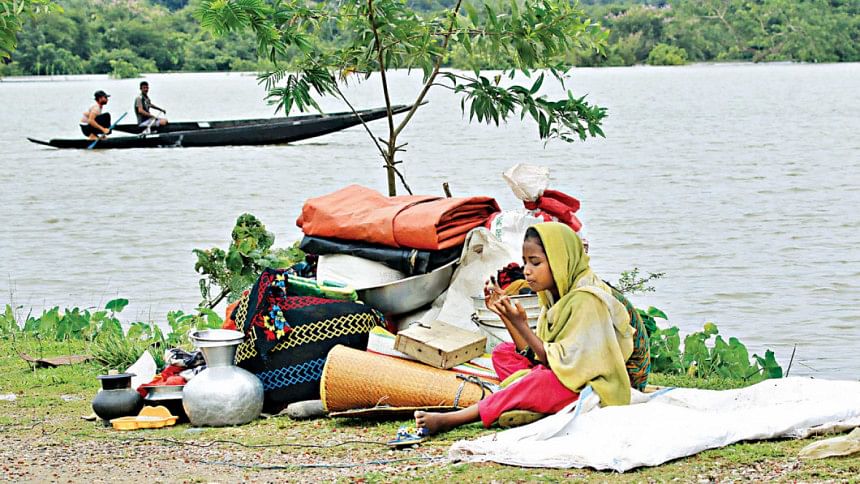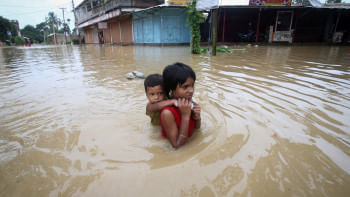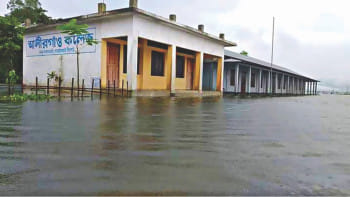Climate change induces anxiety in young people

Climate change is affecting mental health in all communities, especially among the youth. Over the past decade, the anticipated cascade of challenges accompanying climate change has moved from possibility to reality. Extreme weather events, both sudden (earthquakes, flash floods, and lethal heat events) and slow onset (droughts and rising sea levels) are steadily increasing, the consequences of which include, injury, illness, and death.
Although the environmental threats are perilous, climate change also presents serious mental health risks—with post-traumatic stress disorder, anxiety, depression, and learning disorders being just some of the climate-related trauma effects documented in young people. Given that children and adolescents are still developing the psychological and physiological capacity to process its ramifications and have little influence over the economic, political, and social systems charged with responding to or preventing climate events, they are considered particularly vulnerable to the mental health consequences of climate change.
For instance in 2010, three-quarters of young people aged 10-19 years old showed symptoms of post-traumatic stress disorder following flooding in Pakistan. Floods recurred in 2022, and 10 million children required life-supportive care in the immediate aftermath. One year later, four million children were still living near contaminated and stagnant water. While the physical and environmental consequences are easier to quantify, we can only begin to imagine what the long-term mental health consequences will be and how the two catastrophic climate-related events will compound.
Although 40 percent of the world population lives in areas highly vulnerable to climate change—which in and of itself is sobering—those most likely to suffer from its consequences are populations that already struggle economically, socially, and politically. For example, Native American and Indigenous populations are disproportionately affected, and they are already showing signs of climate-related displacement and concomitant depression.
Unlike previous generations, whose awareness of climate change was largely abstract and unlinked to daily life, contemporary young people are more aware of the results of climate change and the dearth of answers surrounding how this will impact their futures. In a recent study of more than 10,000 young people aged 16-25 years old, living across 10 countries (including the United States), more than half (59 percent) reported being very worried about climate change, and 84 percent were at least moderately worried. Nearly half said that their feelings (sadness, anxiety, anger, powerlessness, guilt, and helplessness) negatively affected daily life and functioning, and more than three-quarters find the future frightening and feel a sense of betrayal by adults in general and governments in particular.
Although more than three-quarters of Americans worry about climate change effects, climate-related concerns are especially acute for young people who must navigate core developmental tasks such as finding stable employment, creating supportive social structures, and planning for their futures. Research from the Centers for Disease Control and Prevention shows that suicide rates among young people have trended upward over the past two decades, complementing an epidemic of mental health challenges, and particularly affecting teenage girls, youths of color, and those who identify as gay, lesbian, bisexual, or transgender.
While the challenges faced by our global community are serious and daunting, there are meaningful and effective steps we can take as individuals and communities to buffer the mental health impact of climate anxiety. First and foremost, adults must understand that youth climate anxiety (also referred to as eco-anxiety, solastalgia, eco-guilt, or ecological grief) is an emotionally and cognitively functional response to real existential threats. Although feelings of powerlessness, grief, and fear can be profoundly disruptive—particularly for young people unaccustomed to the depth and complexity of such feelings—it is important to acknowledge that this response is a rational one.
Then, there are also meaningful and effective steps that parents, schools, and communities can take to buffer the mental health consequences. Caretakers and other caring adults can listen to how the young people in their lives are feeling and validate them by authentically acknowledging their perceptions, emotions, and experiences. Although, understandably, adults would not want to actively increase youth awareness of, and discomfort with, the substantial implications of climate change, it is also important that they do not dismiss, negate, or minimise those details. This will be increasingly true over time as climate events and their effects accelerate.
Promoting resilience is another critical focus area. Young people must learn how to identify and manage ruminative thoughts and emotions, as these are likely to increase over time as the sense of existential threat evolves. They should also learn how to quickly recognise and respond to amplified feelings or abnormal behaviors in themselves—and others. Early detection of mental health challenges is an important tool for mitigating full-blown mental health crises. Additionally, young people should work on cultivating and marking moments of joy, awe, or delight; this can balance or offset depressive or anxious feelings. Another approach is connecting to something greater than themselves; this might include volunteering in areas that give them pleasure or otherwise engaging in acts of service that help them feel a sense of meaning and purpose.
Lastly, young people will benefit from constructive outlets for the complex array of feelings that they may have in response to climate change. Caretakers, educators, and community leaders should coordinate opportunities to address these feelings with candor while supplying opportunities to exercise agencies. Such opportunities both enhance academic capacity and potentially provide powerful outlets for anxious energy. This is especially true for high school students who possess the intellectual capacity to grapple with the gravity of the situation and for whom avenues for meaningful action are available. This may include involvement in locally impactful sustainability projects; political engagement at the local, state, federal or international levels; or participating in activities that will support change in an immediate, regional, and visible way. Through such examples, the discomfort that comes from grappling with the potential consequences of climate change can be leveraged in ways that benefit both the individual and the collective.
Professional support can help young people manage the day-to-day emotions that come with climate-related mental health challenges, especially as climate change anxiety has already been linked to substance use and suicidal thoughts and feelings. However, the most beneficial thing for youths will be to receive emotional support in their daily lives and to see adults, community leaders, and institutions (which is to say, those able to create meaningful change) responding to this threat.
Unfortunately, young people are aware that those in positions of power have failed to make a meaningful impact on global trends. Instead, young people have become central actors when it comes to speaking out against climate change. This is partly due to adult inaction in this area and largely because they understand that this issue will disproportionately affect their generation. Although the leadership, vision, and tenacity of these young activists are laudable, it is simply not enough. Furthermore, it is not acceptable to ask our young people to become humanity's "ultimate saviors."
This adultification of youth—expecting young people to take up the mantle as key instrumental leaders for much-needed change—is a problematic response to the growing climate crisis and its mental health effects. Although the public roundly praises the energy, vision, and coordination of young activists, a robust round of applause must not be the totality of their support. Adults mustn't leave proactive responsiveness to young people exclusively.
Young people are in vital need of support from adults. Those in a position to make a difference must especially step up their game, including corporations that disproportionately emit greenhouse gases and other pollutants, energy-focused industries, national and local governments, and political advocacy groups. But all adults should reinforce their care, concern, and support for the issues that are plaguing teens and young adults today; it is crucial to validate their stressors and demonstrate a willingness to join them in acting. Our young people are suffering, and we must address and ease their climate change anxiety now.
Ashik Mosaddik, Ph.D, is pro vice-chancellor and professor of Pharmacy, East West University. Reach him at [email protected].
Views expressed in this article are the author's own.
Follow The Daily Star Opinion on Facebook for the latest opinions, commentaries and analyses by experts and professionals. To contribute your article or letter to The Daily Star Opinion, see our guidelines for submission.

 For all latest news, follow The Daily Star's Google News channel.
For all latest news, follow The Daily Star's Google News channel. 













Comments